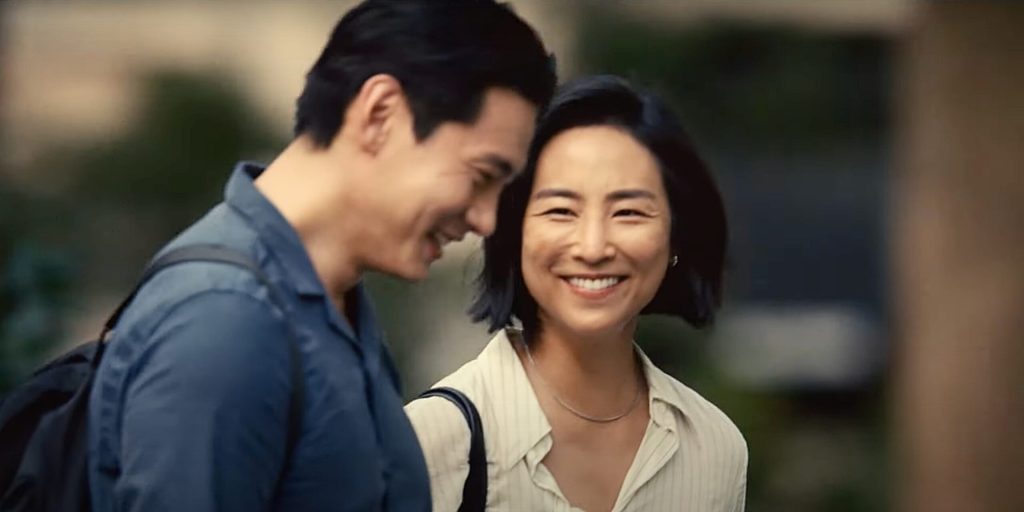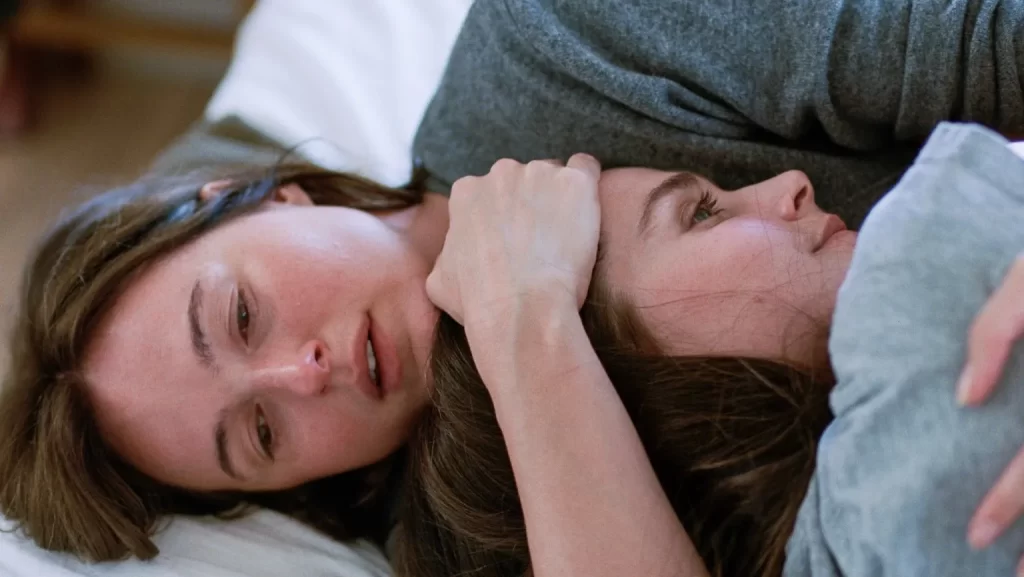Their voices are heard, but they’re not seen – people watchers, and since we’re looking at the same thing they are, that makes us one of them. “Who do you think they are to each other?” one asks, and it’s hard to tell; there’s a Korean man, and a Korean woman, and a white man, sitting at the bar, drinking and talking. The white man looks left out. Why is he there? The Korean man and woman definitely have a spark. Who are they to each other? What do they mean to each other, at this moment?
This opening scene, for Celine Song’s Past Lives, is an ingenious way to pique our curiosity about these three people, and how their relationships with each other will begin and shift over the course of the 100 or so minutes that follow. But it is also, at risk of getting too precious or pretentious, an apt metaphor for the entire act of watching this movie, or, for that matter, any movie: we observe human behavior, how people interact, their postures, their eyelines, the way they talk to each other and (especially) listen to each other, and we try to figure out who they are. Sometimes we even feel that we know them better than they know themselves, based on what we’ve been through, how we’ve been that guy in our lives, that girl that one time.
And this is the particular majesty of this very modest film – it tells a story that is strikingly specific in its particulars, but it tells that story so insightfully and personally that it becomes universal. Not all of us have been that girl, or that guy, or the other one. But we’ve all loved someone when it was too late, or questioned the choices we’ve made, or wondered what our lives would be like if we’d done this one little thing differently.
So back we go, 24 years. Nora and Hae Sung meet as children in Korea, where they are fierce competitors in the classroom; she usually comes out on top, and cries when she doesn’t (“If I beat you for the first time ever and that makes you cry, how do you think that makes me feel?” he asks, not unreasonably). Theirs is a very sweet kid-crush relationship, walks home from school and playdates and the like, but then her parents immigrate their family to Canada, and they part ways, and that’s that.
Twelve years pass. Now in college, they look each other up on Facebook (as we all did); he’s still in Korea, she’s in New York. They get on Skype and start talking again – initially about nothing, harmless small talk, but it’s clear that there’s still a connection. “You’re the same as the 12-year-old kid I remember,” he says, in a complimentary way; whatever it was that they liked about each other, all those years ago, is still present. And it’s just a cute little online relationship, but it escalates, and they’re each staying up too late and going to class too late and biding their time looking up the cost of airline tickets until Nora, sensible Nora, puts on the brakes: “I want us to stop talking for a while.” So they take a “brief break,” primarily to spare their own feelings, which have grown frighteningly intense in a brief period of time.

Twelve more years pass, and the break has gone too well. Nora is now a successful playwright, and Hae Sung has his engineering degree. They’ve haven’t spoken at all, and now Nora is married to Arthur, and Hae Sung has broken up with his longtime girlfriend, and at long last, he’s going to go to New York City – not specifically to visit her, of course (of COURSE), but as long as he’s there… “I just wanted to see you one more time,” he confesses. “I don’t know.”
They don’t seem, initially, happy to have seen each other; they seem kind of terrified, regretful, all sorts of things. Nora talks about it, honestly and openly, with her husband, and what begins as a jokey little chat about the entire situation (“I’m not gonna miss my rehearsals for some dude!”) turns into a long, thoughtful, searching conversation about how “this is where I ended up. This is where I’m supposed to be.” And that’s when the giant subjects in this tiny little movie really begin to reveal themselves.
If Past Lives does nothing else – and it should do quite a bit – it should finally establish Greta Lee as a dazzlingly talented movie star, charismatic and funny and supremely gifted. (She has a moment here where she gives Arthur a little smirk, a little go-ahead with her eyes, that’s one of the most charming things I’ve ever seen in a movie.) Teo Yoo has a tougher role as Hae Sung, particularly since so much of the picture depends on him being stoic and regretful, but he finds every single shade of those colors. And John Magaro may have the trickiest time of all as Arthur, since he’s the third wheel, the one who hasn’t been with the other since they were literal children, and yet he understands his place in this equation, and is at peace with it.
It’s tempting to oversell Past Lives, since it’s such an overwhelmingly, devastatingly emotional experience; the picture is so mellow and melancholy that putting too many overstuffed hyperboles on its name could crumple it up like a piece of tissue paper. But while sobbing through its closing scenes, I was reminded of Roger Ebert’s acknowledgment that “I never cry during sad moments in the movies, only during moments about goodness.” That’s why Past Lives hits as hard as it does: because they’re all such good, kind people, and you want what’s best for them, even though there’s no single thing that can be that for them all.
A+
“Past Lives” is out Friday in limited release.



